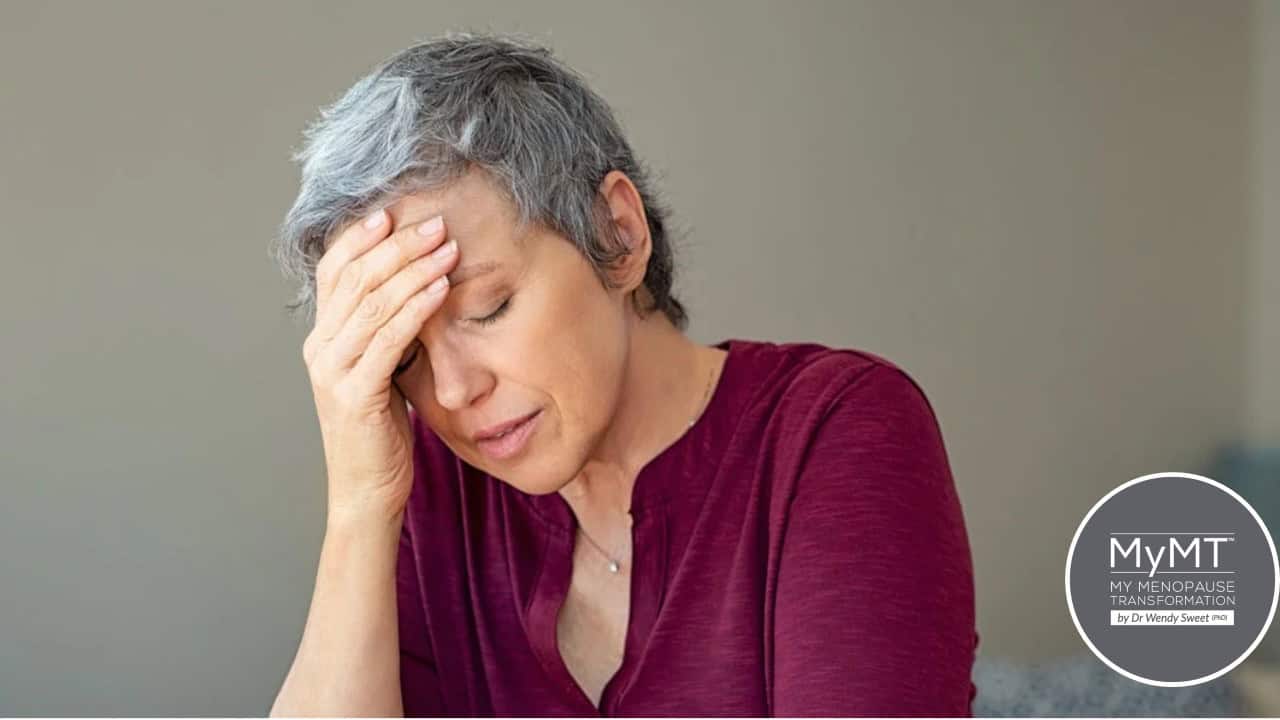Nurses have been on my mind this week as I’ve had a number of them register for my Lifestyle Science Menopause Practitioner Course.
It reminded me to share with you, the amazing story from former Registered Nurse, Wendy Gordon, from Melbourne, Australia. Wendy came on board with me as a MyMT™ Affiliate Practitioner, I couldn’t help but resonate with how she was feeling at the time. I hope you can read her story HERE.
Thousands of nurses were interviewed in the United States Study of Women’s Health Across the Nation (SWAN) and results indicate that yes indeed, our lowering oestrogen in menopause impacts on our anxiety and stress levels. As the study mentions,
‘Women were more likely to report high anxiety symptoms when early or late peri-menopausal or postmenopausal compared to when they were pre-menopausal. This is independent of multiple risk factors, including upsetting life events, financial strain, fair/poor perceived health, and VMS (vaso-motor symptoms/ hot flashes).‘
I wonder if you’ve noticed your anxiety levels increasing too? And whether you know that menopause-related anxiety arrives, not only because our nervous system is ageing and changing as oestrogen levels decline, but alongside these reproductive changes, may also be an increase in inflammation in our cells and tissues – this includes our ageing brain and the nerves that we rely on to help us function from day to day.
‘Major aspects of human cognitive function are influenced by a variety of factors including genetics, lifestyle, nutrition, disease, trauma, medicines, as well as both normal and pathological ageing‘ mentions an extensive 2017 review of the ageing brain (Vauzour, Camprubi-Robles et al 2017).
The study reports on a convincing body of evidence demonstrating that notable age-related decline in cognitive (brain) function occurs in all healthy individuals starting from the late 20s and continuing throughout the adult lifespan.
Some headline conclusions from this research are that such decline occurs in all individuals and concerns a wide range of major aspects of cognitive function (i.e. not simply memory) and that ageing of the brain speeds up, not only because of emotional stress, but oxidative (cellular) stress as well as anaemia, changing cardiac health, being overweight and of course, inflammation of the nervous system.

For women transitioning through menopause, this is important information. As I often mention, menopause is a vulnerable time for our health – let alone our mental health. With so much stress in our lives, menopause-related anxiety is a prevalent symptom which seems to arrive at the door of our late 40s and early 50s – HRT aside, what if it didn’t have to be this way?
What if we could turn back the clock through understanding that menopause is the biological pathway that we are all on which leads to our ageing years? As such, what if we could follow the ageing science and put into effect some lifestyle strategies that dial down the anxiety and help you to find calm in the chaos?
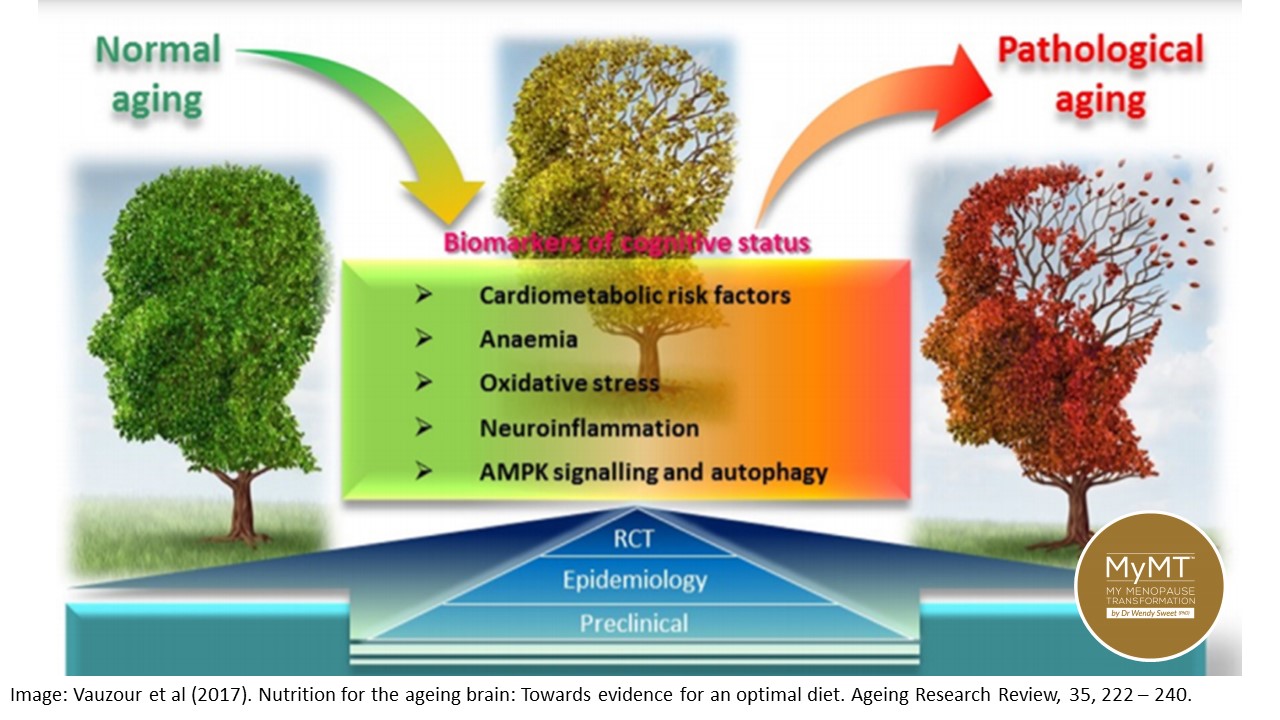
Your Changing Anxiety Levels During Menopause
Stress and anxiety are interesting phenomena. I’ve studied them both for decades, but not in the context of menopause. But rather in the context of sport and exercise science and the accumulation of physical stress in athletes and regular exercisers.
Some stress from placing increased demand and effort on the body is good in the sense of how we adapt positively to exercise and training loads. For athletes, the need to do this in training is how they increase their performance and ‘adapt’. It’s called the General Adaptation Response.
However, when athletes place too much load on the body and aren’t recovering, then this can be detrimental to their ongoing physical and mental health. For female athletes who are over-training, their symptoms present as a host of familiar symptoms to women in menopause. These include,
- Insomnia
- Fatigue
- Changing thyroid function which can lead to glandular fever
- Sore and aching muscles which can lead to fibromyalgia
- Hot flushes
- Stiffer tendons
- Anxiety and brain fog.
Do these symptoms sound familiar to you too?
The difference for those of us experiencing menopause-related anxiety is that we may not be taking into account our ageing nervous system and brain, and the changes that manifest during menopause.
As our nervous system loses the role of oestrogen in the outer layer called the myelin sheath, it becomes more ‘irritable’. Chemical messages don’t get sent properly and this increased nervous-system irritability makes our heart rate speed up and we feel more anxious.
Add to this, not sleeping, too much (or too little) exercise, as well as a poor diet, then we start to feel wired, tired, worried and anxious. For many women in mid-life, it’s not long before we experience ‘Burn-out’. I’ve had women on my 12 week programmes who have had to give up their careers because they aren’t coping. That’s tough. Really tough.
However, if we don’t allow our nervous system to calm down or give it the right nutrients, we run the risk of remaining in the ‘red zone’ of our adrenals working overtime in ‘fight and flight’ mode day after day. This spells disaster for hot flushes, depression, brain fog and of course, our temperament. If you’ve been feeling irritated with the dog, the cat, the kids or your partner or work colleagues lately, you will know what I mean.
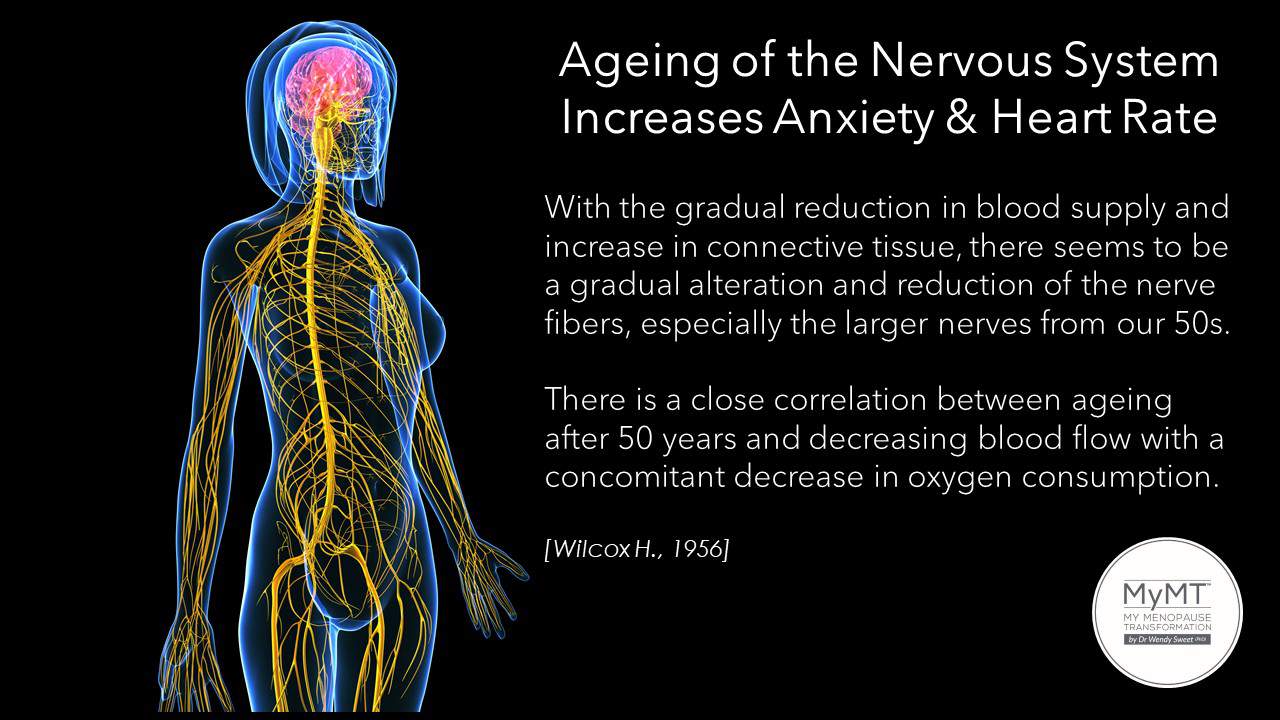
Finding CALM in the Anxiety-fueled mid-life Chaos:
- If you stop and reflect on what is going on in your life at the moment and whether you feel a bit ‘under-the-pump’ with it all, I wonder if you are also thinking about how your stress levels impact on the absorption of your beautiful, energy-forming B-vitamins. If you aren’t sleeping or feeling anxious, your skin is dry and brittle and/or you are putting on belly-fat by the week (up to 2kg a week can go on during menopause), then my guess is that you aren’t focused on your beautiful B-vitamins. How about we change that will we?
Vitamins B6, B9 and B12 help to reduce stress and aid in the transmission of nerve impulses as you age. One of the major changes in menopause is the loss of cells that help to make up the myelin sheath which is the outer surrounding of our nerves. B-vitamins help to repair and restore the function of nerve transmission as we age. As part of the MyMT™ programmes, I encourage women to get blood work done and get their Dr to check B12 levels because if they are low as women transition menopause, then this can give them the feeling of tingling, increased anxiety or poor exercise recovery as well. In which case, good old-fashioned Floradix Formula may help too.
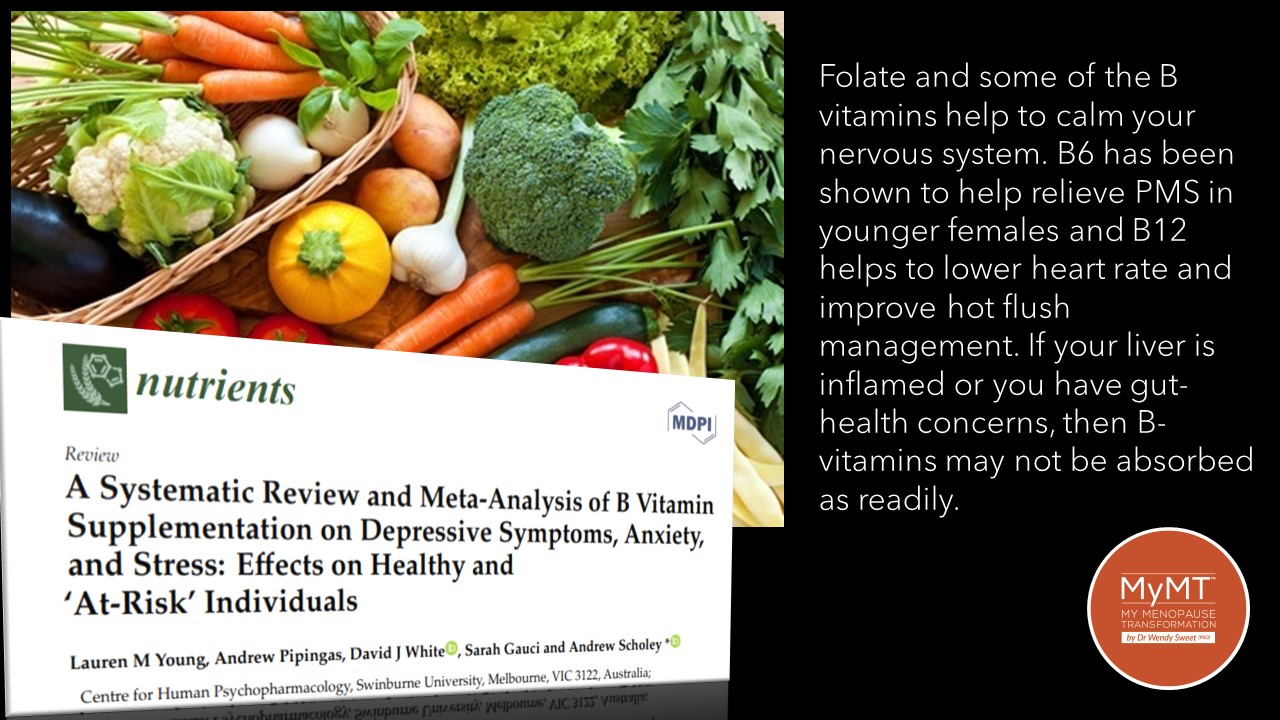
2. Learn to breathe better: Learning to breathe more deeply is fundamental to reducing our stress levels. I teach women on my programmes how to do a simple breathing technique called Diaphragmatic breathing. It works. A growing boody of research reveals that diaphragmatic breathing may trigger body relaxation responses and benefit both physical and mental health because it helps to lower the chronic stress hormone, cortisol. So, when you are feeling anxious, no matter the time of day or night, then work on your breathing. It only takes a few minutes. It’s a powerful strategy that I teach women to do in the MyMT™ programmes.
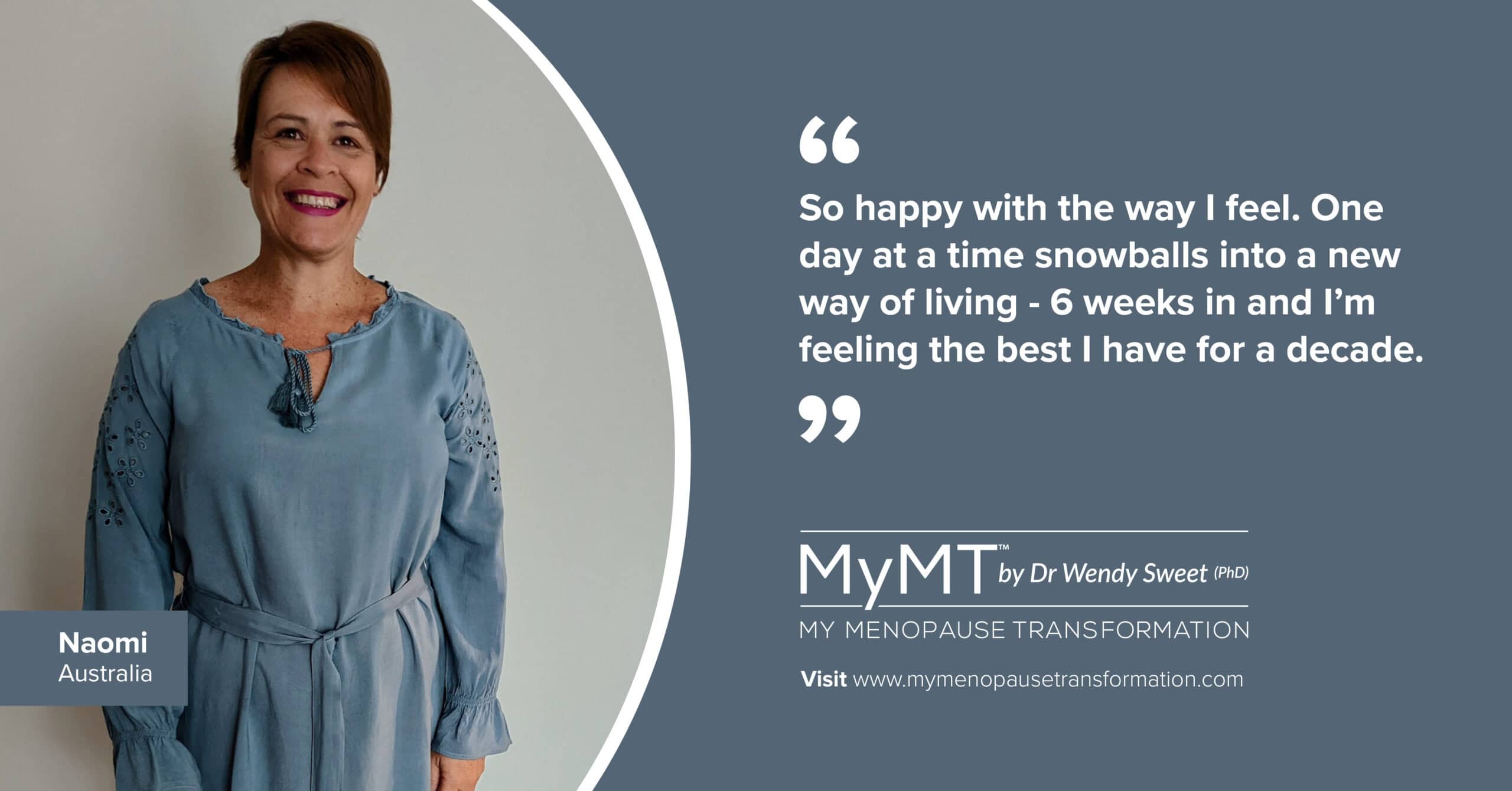
3. Don’t over-eat! Many of us know that hormonal changes and feeling exhausted and anxious can cause us to binge-out on the chocolate bars you have stashed in the fridge or the car. Unfavorable dietary behaviours of female nurses, especially among shift-working nurses, including high snacking frequency, short fasting period and large day-to-day energy intake variability was linked to adverse metabolic and psychological health (Terada et al., 2019), so please take note, especially those of you who are nurses as Lydia is in the image below.
Because your digestive system is supplied by the same nerve that stimulates your heart rate and blood pressure (the vagus nerve), over-eating means that this important nerve is stimulated for digestion, rather than slowing down your system. This is why racing around and eating on the go, can cause so many stomach issues in women as they age.
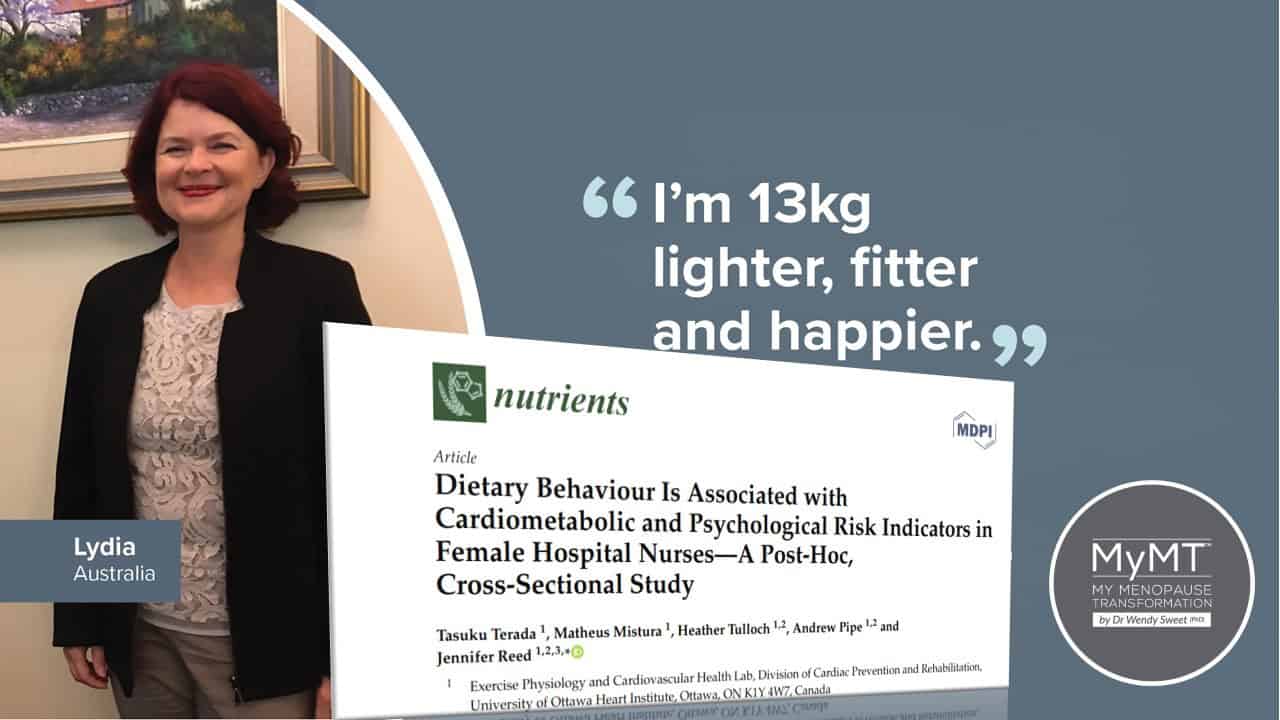
Like millions of women around the world, I’ve followed conventional wisdom about how to manage my menopause symptoms through various supplements and medications. I did workouts to try to manage my weight delivered by wonderful young exercise professionals who probably hadn’t even heard of menopause, and I followed high fat, high protein popular diets of the day.
At the time, I was also undertaking my women’s healthy ageing studies. I’m thankful that I was. Because from the work of Margie Lachman (2004, 2015), I learnt about midlife as being a pivotal time for women’s health as they aged. I became curious about what was really going on with our symptoms.
Many of us are not prepared for this perfect-storm in middle age, but it is indeed a period of marked diversity (Lachman, 2004). As Lachman says,
“Not only is our body changing hormonally, but as many of us have found or are finding, we also have to juggle many competing demands, including roles not only as workers, but as spouses, parents, and these days, looking after adult children as well.
As such, the impact of the accumulation of stress from numerous sources, it’s a time when many women experience precursors to health problems (e.g., high cholesterol, high blood pressure, sore joints) or some of the same conditions as their parents (e.g., Type 2 diabetes, weight gain and hypertension). A range of expected (e.g., children leaving home) and unexpected (e.g., loss of parents, being laid off) events may occur during midlife.”
That’s when I began to realise that not only did I feel stressed with all that was going on in my life, but with menopause arriving, including insomnia, weight gain, then my busy, stressful life, meant that I was indeed ‘under stress’.
When our body and brain is under-stress, it is burning through our beautiful B-vitamins. If our B-vitamins aren’t being absorbed, our sleep becomes worse, we may put on belly-fat, energy levels crash and we feel that we can’t keep up with all that’s going on in our busy, active (or inactive) lives. Sound familiar?
Menopause is the biological gateway to our ageing years. This means that there are changes going on all around the body and for too long this age and stage of life has been positioned in ‘sickness’. But it shouldn’t be. It needs to be positioned in ‘wellness’ instead. That’s what I teach you on the MyMT™ online 12 week programmes, (these differ depending on whether weight loss is desired or not). Thousands of women have joined me over the years and feel as if they have taken back control of an important stage of life.
I hope you can join me too, as I can’t wait to show you the way through menopause into your healthy ageing years ahead.

References:
Bourre J. (2006). Effects of nutrients (in food) on the structure and function of the nervous system: update on dietary requirements for brain. Part 1: micronutrients. J Nutr Health Aging. Sep-Oct;10(5):377-85. PMID: 17066209.
Ford T., Downey L., Simpson T., et al. (2018). The Effect of a High-Dose Vitamin B Multivitamin Supplement on the Relationship between Brain Metabolism and Blood Biomarkers of Oxidative Stress: A Randomized Control Trial. Nutrients. 10(12):1860. doi: 10.3390/nu10121860.
Ma, X., Yue, Z. Q., Gong, Z. Q., Zhang, H., Duan, N. Y., Shi, Y. T., Wei, G. X., & Li, Y. F. (2017). The Effect of Diaphragmatic Breathing on Attention, Negative Affect and Stress in Healthy Adults. Frontiers in psychology, 8, 874. https://doi.org/10.3389/fpsyg.2017.00874
Pesonen, H., Laakkonen, E.K., Hautasaari, P. et al. (2021). Perimenopausal women show modulation of excitatory and inhibitory neuromuscular mechanisms. BMC Women’s Health 21, 133. https://doi.org/10.1186/s12905-021-01275-8
Terada T., Mistura M., Tulloch H., Pipe A., Reed J. (2019). Dietary Behaviour Is Associated with Cardiometabolic and Psychological Risk Indicators in Female Hospital Nurses-A Post-Hoc, Cross-Sectional Study. Nutrients. 11(9):2054. doi: 10.3390/nu11092054. PMID: 31480696; PMCID: PMC6770286.
Vauzour, D., Camprubi-Robles, M., Miquel-Kergoat, S. et al (2017). Nutrition for the ageing brain: Towards evidence for an optimal diet. Ageing Research Reviews, Volume 35, 222-240, ISSN 1568-1637, https://doi.org/10.1016/j.arr.2016.09.010.
